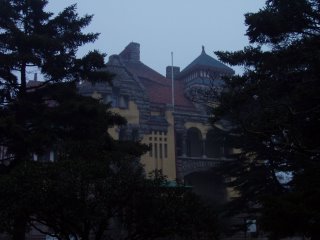Chinese is a language suffused with commonly used puns on many words due to the extraordinary (and burdensome to the beginner) amount of homonyms, which are differentiated by their tones. This is why four, 四, si, fourth tone, is a symbol of bad luck (it sounds like to die 死, si, third tone) and why the symbol fu 福 , or good fortune/happiness/blessing, is often hung upside down in homes: upside down, dao 倒, third tone, and to arrive or get, dao 到, fourth tone, are homonyms. Thus, ‘dao fu’, or get fortune. These puns prevail all throughout the language, usually related to either auspicious/good or inauspicious/bad things. Fish, or yu 鱼, is often served on, say, somebody’s birthday or a special occasion since one of its homonyms means long lasting, 余yu. So, you can see how tones become all important. For the sound ‘shi’, get this, there are over forty-five different characters and thus meanings!! It is, I believe, the most commonly used sound, being used to express ‘to be’, ‘food’, ‘know’, ‘truth’, and many others. Keeping the characters straight in one’s head can be a pain in the ass! My host father told me that sometimes Chinese will have competitions with friends on who can create sentences with one sound. The classic: ma ma ma ma ma 妈妈骂马吗? Does mother curse/scold the horse? They all seem kind of random to me, however, since there are often so many homonyms that many, many words could have puns. Of course, the amount of homonyms I believe are a serious inadequacy in the language in terms of it ever becoming a feasible world language. Even Chinese sometimes need to ask each other for clarity regarding which character they mean! Thus, the most important aspect of talking with a Chinese person as a beginner is context. Try to bust a non sequitur, and they may be stumped. And now the reader understands why tones are so important to pronounce correctly.
This also makes brand names and a person’s name so vitally important and the reason why transliterations of names can be so botched. Roosevelt, for example, sounds like lucifer. You have to be careful of the character you use in the name and its homonym, as well as the meaning of the characters together, and the tones (if all of the characters have the same tone in a name, this is considered inauspicious or crude). Sprite had to change its name after first entering the Chinese market because it used a character that sounded like to die. Even more frustrating is that different regions in China pronounce characters differently, so that, for example, shi will sound like si, or zhi like zi, or vice versa! It’s incredibly convoluted.
Puns can go a little further too, whereby the pun of an answer to a quip is the meaning intended. The following are some examples:
外甥打灯笼 – 照舅. (照旧)waisheng da denglong—zhao jiu. (zhao jiu) Nephew is lighting the lamp—call uncle. (as always/usual) “Call uncle” sounds like ‘zhao jiu’, which puns what’s in the parentheses: zhao jiu, which means, ‘same as before’, or ‘as always’. So, say I have a son who always fails his exams. If he comes home one day and tells me he failed again, I could turn to my wife and say: Nephew is lighting the lamp.
孔夫子搬家 – 净是书. (输)Kong fuzi banjia—jing shi shu (shu) Confucius is moving—only books. (lose) The pun here is on shu, which means books and to lose. So if I am playing a game of poker and I (am gonna) lose, I could say: Confucius is moving.
飞机上挂暖壶 – 高水瓶. (高水平)Feiji shang gua nuanhu—gao shui ping. (gao shui ping) There is a thermos in a plane—high water container. (high level) So if I am complimenting somebody’s language level I could say: There is a thermos in a plane.
You guys get the point. Here are a couple more:
电线杆上插鸡毛 – 好大的掸子. (好大的胆子)The meaning I am not clear about, but the pun is on dan zi, which puns a duster and bravery/courage.
烂棉花 – 没法弹. (没法谈) Rotten cotton--must toss it. (must discuss). The pun here is on tan, which means to fling, or throw away, and talk/discuss.




